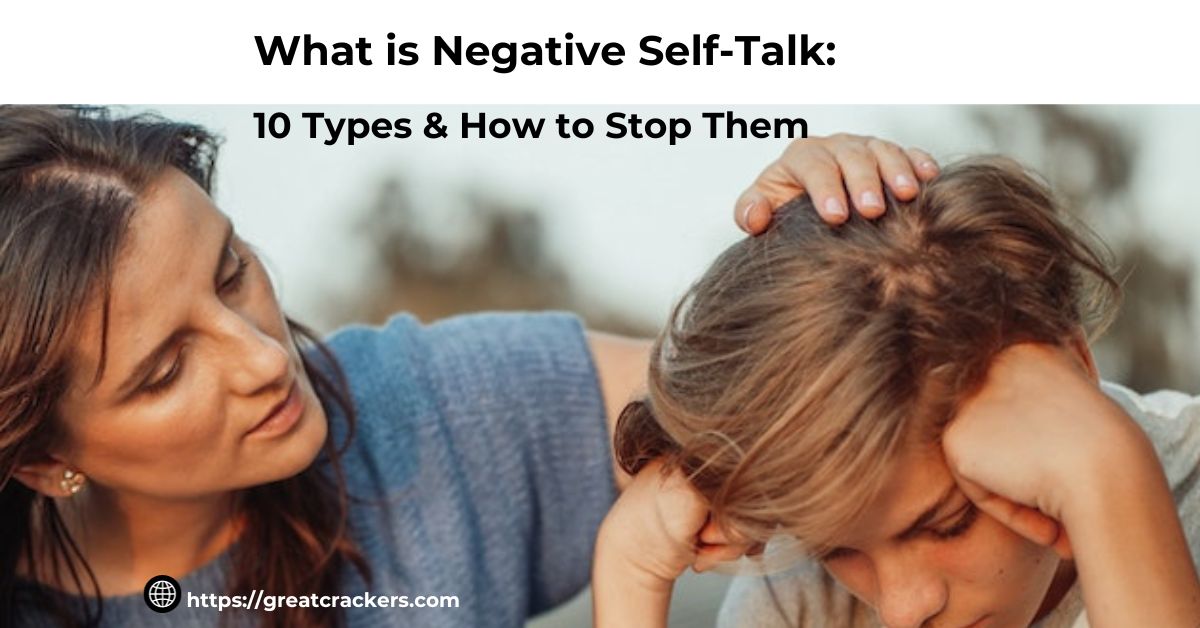What is Negative Self-Talk: 10 Types & How to Stop Them
Did you know that most people, on average, have negative thoughts about themselves at least once every hour?
Negative self-talk is when you keep thinking unkind and gloomy thoughts about yourself. It’s like a constant stream of negative thoughts that quietly bothers you.
In this article, you’ll learn about “negative self-talk.” We’ll talk about ten different kinds of it and how it can affect you in many ways. Above all, you’ll discover practical ways to stop these negative talks to help you stay mentally healthy.
What is Negative Self-Talk?
Negative self-talk is like a mean voice inside your head that does nothing except point out your flaws. And eventually, it makes you feel bad about yourself.
So, when you doubt your abilities, know it’s just your inner critic talking. Sadly, this causes self-doubt, self-criticism, and unnecessary fear of failure, which can hold us back from our potential.
Moreover, negative self-talk can even make you see things in a way that isn’t true. For example, it makes you believe you can’t do what you can do. This cycle of negative self-talk often starts when something bothers or upsets you.
As a result, you may think and feel terrible about yourself. But recognizing this pattern is a good start to break free from it. That involves questioning these ill thoughts and treating yourself more compassionately.
What Causes Negative Self-Talk?
For many people, negative self-talk is a mystery; they don’t know its root cause. But as a stern inner critic, it feeds on many things we classify as external and internal. They are places where self-sabotaging talks emanate from:
A. Internal Factors
1. Low Self-Esteem
Low self-esteem fuels negative self-talk. This is true because individuals with complex or poor self-esteem see themselves as unworthy or incapable. Sadly, this inner negativity becomes a constant dialogue, reinforcing their negative self-perception.
2. Perfectionism
Another internal factor that causes negative self-talk is perfectionism. That’s because it breeds negative self-talk through unrealistic high standards. And when you don’t meet these impossible goals, you begin to criticize yourself, fueling a cycle of self-doubt and self-criticism.
3. Past Trauma and Experiences
A person’s terrible past experiences can make him think and talk negatively about himself. That’s because hurtful memories can come back and make one feel like one isn’t good enough and blame oneself.
B. External Factors
1. Media and Societal Influences
When you compare yourself with others, you’ll eventually start feeling like you’re not good enough and doubting yourself. Sadly, that’s one thing the present-day media do so well.
Take social media, for example, where you only see perfect-looking people and things because that’s what they choose to show. If you don’t guide your heart, you might begin feeling bad about yourself or your achievement due to unhealthy comparisons.
2. Critical Relationships
Imagine having a friend who constantly points out your flaws and makes you feel small. Without a doubt, this kind of critical relationship can make you doubt yourself. It’s like a voice (in your head) that keeps screaming you’re not enough.
3. Cultural and Social Norms
Imagine living in a community or society where everyone expects you to be a certain way when that’s not who you are. Perhaps, your community expects you to be more outgoing, but you’re naturally quiet.
Of course, trying hard to live up to these expectations can be overwhelming. On top of that, it can make you feel like you’re not good enough, even while you stay hard on yourself.
10 Types of Negative Self-Talk
While negative self-talk is a self-sabotaging behavior, it can manifest in various ways. Below are 10 negative self-talk and how they manifest:
1. Catastrophizing
This is a form of negative self-talk where you imagine the worst possible outcomes in situations. For example, let’s say you forgot your male friend’s birthday. This type of negative self-talk can begin to express itself in your imagination.
As a result, you might think something like this, “He’ll (your friend) never speak to me again, that I’ve ruined our friendship with him.” It’s like making tiny problems seem much bigger than how they are in your mind.
2. All-or-Nothing Thinking
This form of negative self-talk gains expression when you view things in two extremes with no middle ground. For example, you can see something as perfect or a total failure. Let me use a practical to explain to you.
Imagine not scoring an A but a C in a test. “All-or-nothing” thinking can fuel negative talk in one’s head and make one think something like this:
“I’m a total failure at school.”
3. Personalization
“Personalization” is when you unfairly blame yourself for things you can’t control. For example, if a friend cancels plans, a person may think, “It’s my fault because I’m boring.” It’s like believing everything is about us, even when it’s not.
4. Overgeneralization
This happens when we use one terrible experience to predict that bad things will always happen. For example, if you mess up one job interview, overgeneralization can make you say something like this:
“I’ll never get any job!” It’s like thinking everything will be awful based on a terrible not-too-good experience.
5. Self-Blame
“Self-blame” is when you take responsibility for things you didn’t cause. For example, if a work project doesn’t go well, you may say, “It’s all my fault; I’m terrible.”
Essentially, it’s feeling guilty for what we couldn’t control, and that’s not fair to ourselves.
6. Should Statements
These happen when we tell ourselves what we should or must do. It’s setting up impossible expectations. Imagine saying to yourself, “I should always be perfect.” Of course, that can make you feel not good enough when you can’t be flawless.
It’s related to “All-or-Nothing” thinking, whereby you make difficult rules for yourself that are tough to follow.
7. Mind Reading
“Mind Reading” is when we assume we know what others think about us without any real proof. For example, you may think this about other people, “They must think I’m a failure,” even when you don’t know.
And sadly, that can make you doubt yourself for no reason. It’s like trying to guess what someone else is thinking. And it often makes us think the worst is true.
8. Filtering
This happens when you only see the bad side of things while ignoring the good. For instance, imagine being obsessed over a mistake you made during a great presentation.
As a result, you’re saying things like this:
“I totally messed up,” it’s like trying to see a beautiful picture through a dirty lens and missing all the good stuff.
9. Labeling and Mislabeling
This is a form of negative self-talk that entails giving yourself harsh labels because of small mistakes. For example, imagine saying, “I’m such a terrible friend,” because you forget someone’s name.
It’s like calling yourself a bad name just for a little slip-up instead of realizing it happens to everyone.
10. Emotional Reasoning
This form of negative self-talk manifests when you believe your feelings are facts. For instance, if you feel anxious about a social event and think, “I must be boring.”
Of course, doing that is like treating your emotions as if they prove something true, even when they might not be.
The Impact of Negative Self-Talk on Mental Health
A. Anxiety and Depression
Like anxiety and depression, Negative self-talk can harm mental health. In the United States, a study shows an estimated 21.0 million adults experienced at least one major depressive episode. Unfortunately, harmful self-talk can worsen these conditions, reinforcing feelings of worthlessness and hopelessness. Seeking help is crucial.
B. Low Self-Esteem
This is a mental condition that can hurt a person’s mental health. As Buddha once said, “You deserve your love and kindness as much as anyone else in the whole universe.”
However, low self-esteem makes it difficult to be happy, have good relationships, and achieve success. All these affect how one feels mentally. That’s why you must boost your self-worth, even by how you talk to yourself.
C. Relationship Issues
When you talk negatively to yourself, it can harm your relationships and mental well-being. No doubt, constant self-doubt can create trust and communication issues, and that can cause misunderstandings and conflicts.
Sadly, this self-doubt can worsen anxiety and depression and lower self-esteem.
D. Limiting Personal Growth
As said already, when we’re hard on ourselves with negative self-talk, it can damage our relationships. Constantly feeling unworthy can breed insecurity and jealousy in a relationship. And that can mount stress on any relationship, and ultimately impact one’s mental health.
How Can You Break the Habit of Negative Self-Talk?
A. Self-Awareness
Being self-aware can fight negative self-talk. When you identify those unhelpful thoughts and jot them down in a journal, you learn about your thought patterns and what sets them off.
For example, when you catch yourself doubting, you can challenge those thoughts and replace them with positive affirmations, breaking the cycle of negativity.
B. Challenging Negative Thoughts
To beat negative self-talk, spot thinking errors like overgeneralizing. Then, gather proof that goes against these thoughts.
For instance, when you believe you always fail, remember past wins. This practical method helps reshape negative thoughts, fostering a more positive and realistic self-view.
C. Cultivating Self-Compassion
To stop negative self-talk, try self-compassion. This means being kind to yourself instead of criticizing harshly.
Treat yourself like a good friend: accept your imperfections without judgment and practice self-kindness. This builds a more positive and supportive inner dialogue.
D. Positive Affirmations
Positive affirmations are short, uplifting statements you say to yourself daily to counter negative self-talk. Negative self-talk is when you criticize or doubt yourself.
By repeating positive affirmations like “I am confident” or “I can achieve my goals,” you rewire your mindset, boosting self-esteem and breaking the habit of negative self-talk.
E. Seeking Professional Help
Seeking professional help is a crucial step in overcoming negative self-talk. Therapists and counselors can provide valuable strategies and support to break this habit.
They offer guidance and techniques to improve self-esteem and develop healthier thought patterns. And that can lead to a more positive self-perception.
Practical Strategies to Stop Negative Self-Talk
A. Mindfulness and Meditation
Mindfulness and meditation are effective tools to halt negative self-talk. They help you observe your thoughts without judgment and create distance from them.
As Jon Kabat-Zinn said, “You can’t stop the waves, but you can learn to surf.” Through these practices, you can navigate your thoughts and choose positivity over self-criticism.
B. Cognitive-Behavioral Therapy (CBT)
Cognitive-behavioral therapy (CBT) is an effective strategy to combat negative self-talk, which involves self-criticism and doubt. CBT helps identify and challenge these harmful thought patterns, replacing them with positive ones.
With the guidance of a therapist, individuals learn to reframe their thinking, promoting self-confidence and mental well-being.
C. Surrounding Yourself with Positivity
Surrounding yourself with positivity involves being around supportive people, uplifting environments, and inspirational content. For example, spending time with encouraging friends or filling your social media feed with motivational quotes can boost self-esteem and reduce negative self-talk.
Beyond a doubt, positive influences can reshape your mindset, making it easier to stay confident and optimistic.
D. Goal Setting and Achievement
Setting and achieving goals is a powerful strategy to combat negative self-talk, which involves self-criticism and doubt. When you accomplish goals, you prove to yourself that you’re capable.
And that builds self-confidence and shifts focus away from negative thoughts, fostering a more positive self-perception. Success reinforces positive self-talk.
E. Developing a Support System
Developing a support system is essential to tackle negative self-talk, which involves self-criticism and doubt. That’s why you should surround yourself with understanding friends, family, or a therapist that offers a safe space to share thoughts and emotions.
They can provide encouragement, perspective, and constructive feedback, helping you break the cycle of negativity and build self-esteem.
What Is Negative Self-Talk vs. Healthy Self-Critique?
Negative self-talk is when you constantly criticize yourself harshly, believing you’re not good enough. It’s damaging and can lower self-esteem.
Healthy self-critique, on the other hand, involves constructive feedback to improve without hurting your self-worth. Recognizing the difference is crucial for personal growth, so encourage growth-oriented self-talk for a more positive mindset.
Final Thoughts
We’ve seen the various ways negative self-talk manifests itself. The ten harmful patterns include perfectionism, self-blame, catastrophizing, and others. To stop them, you need to identify these thoughts, challenge their accuracy, and replace them with positive affirmations.
Furthermore, you need to cultivate self-compassion and seek support when needed. You can boost your confidence and well-being by embracing a positive inner dialogue.
Remember, changing negative self-talk takes time, but it’s worth the effort for a happier and healthier life.







